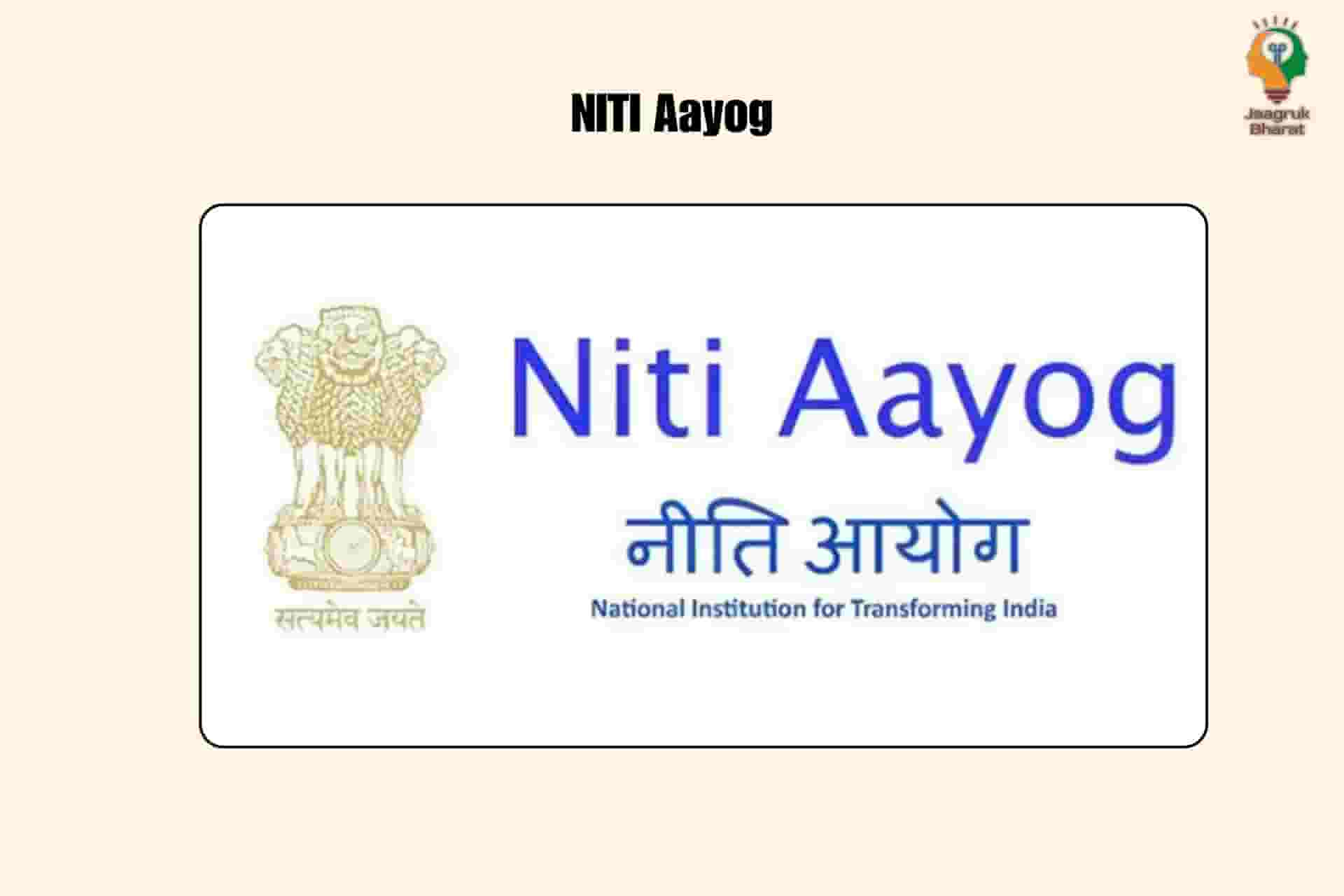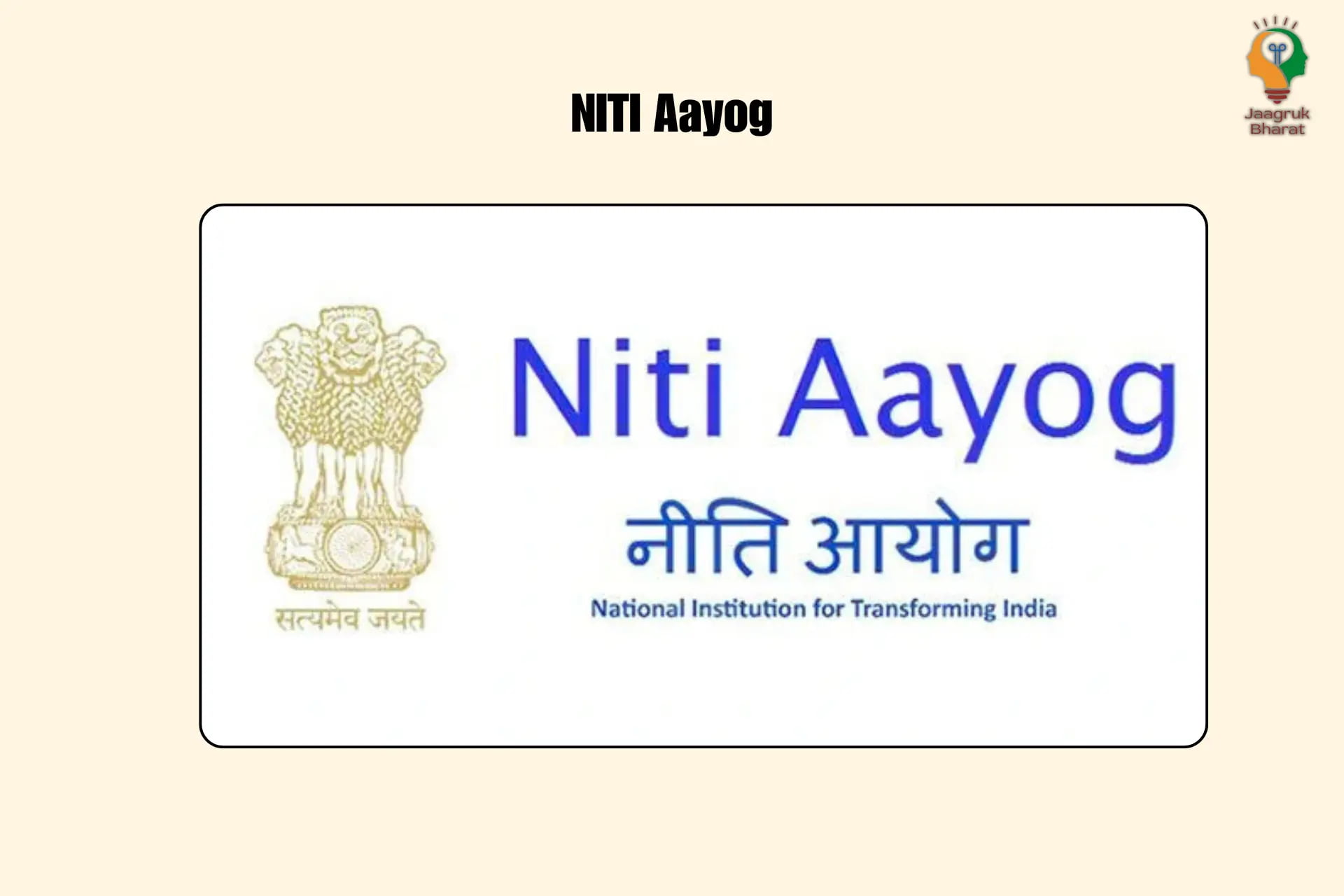NITI Aayog: Transforming India's Development Agenda
Updated: 13-10-2025 at 4:55 AM
1k


Everyone must adapt to changes and survive as per the needs of the time including nations. India is a diverse and the most populous country in the world and one of the components which lays the foundation for managing such a country is planning. When one looks at the past, the main body responsible for the country’s economic planning was the Planning Commission of India. However, the commission was soon dissolved due to several reasons like rigidity in the model.
This gave birth to the National Institute for Transforming India also known as the NITI Aayog (नीति आयोग) established by the Indian government in 2015. The NITI Aayog replaced the Planning Commission and eliminated all its shortcomings like the rigid model. It runs on the principle of participation (more minds, more ideas) and focuses on promoting innovation for the prosperity of the nation.
| Institution | NITI Aayog |
|---|---|
| Full form | National Institute for Transforming India |
| Established in | 2015 |
| Replaced who | Planning Commission |
| Chairman | Prime Minister of India |
| Objective | To promote innovation, long-term economic growth and development |
| Also Read: NITI Ayog And Karmayogi Bharat Launch 6 SAMARTH Curated Courses |
What Is NITI Aayog (नीति आयोग)?
NITI Aayog (National Institute for Transforming India) formed in 2015 by the government of India is a think tank that focuses on promoting innovative thinking and sustainable development of India’s economic growth. The organisation’s chairman is the Prime Minister of the nation (at the moment, it is Shri Narendra Modi). NITI Aayog replaced the Planning Commission and incorporated decentralised planning where everyone has the opportunity to put forth their views and opinions.
Objectives
The NITI Aayog entails several key objectives having one goal and. i.e. to develop India and help in shaping its future. Some of the objectives are:
-
Policy formation: NITI Aayog is responsible for creating policies for the country’s development. It develops policies for various sectors such as agriculture, education, health, and overall infrastructure.
-
Cooperative federalism: It aims to establish a healthy connection between central and state governments so that both parties can make a decision collectively.
-
Innovation: The organisation aims to promote innovation and encourage creative thinking of every member involved in the work of developing a rich country like India.
-
Monitoring: NITI Aayog is responsible for regularly monitoring the proper implementation and progress of various policies and schemes.
Learn more: NABARD- Know Everything About Its Functions and More in India
Pillars
NITI Aayog’s foundation stands upon certain pillars without which the whole foundation will fall. Those pillars are discussed below in detail:
-
Cooperative federalism: The organisation ensures and promotes collaboration between central and state governments so that they can unanimously take part in the decision-making processes. NITI Aayog is a platform that connects central and state governments to address national challenges.
-
Competitive federalism: The organisation also encourages healthy competition among state governments to improve the conditions of their respective states and serve as a role model for other state governments.
-
Sustainable development: NITI Aayog works on designing long-term plans and policies for the country’s development. It formulates policies by considering changing times, present trends, and technological developments.
-
Decentralised planning: It includes decentralised planning wherein all the bodies including central, state, and local bodies participate in the decision-making process.
Achievements
NITI Aayog has achieved many milestones and stepped up on the ladder of development since the day it was established. Some of its key achievements are highlighted below in detail:
-
Aspirational Districts Programme: NITI Aayog launched the Aspirational Districts Programme in 2018. It focuses on improving the socio-economic conditions of the underdeveloped parts of India through developing sectors like health, education, agriculture, and others.
-
Sustainable Development Goals: The organisation implements and works per the UN Sustainable Development Goals (SDGs) at national and state levels. An annual SDG report is also published to track the progress and address the feedback if any.
-
Atal Innovation Mission: The Atal Innovation Mission was launched under the purview of the NITI Aayog to promote entrepreneurship in India and encourage the development of startups. The mission has developed Atal Tinkering Labs (ATL) in schools to promote creative thinking in children. As of now, the scheme has established more than 10,000 ATLs in schools across India.
-
Ayushman Bharat- National Health Protection Scheme: NITI Aayog has also played a major role in the working of one of the largest health insurance schemes in India. i.e. the Ayushman Bharat scheme. It provides coverage of up to Rs. 5 lakh per year.
Read more: National Institution for Transforming India-Shaping India’s Development Future
Composition
The structure of NITI Aayog is organised in a manner that would help in ensuring representation from all levels. The composition is as follows:
-
Chairperson: The Prime Minister of India serves as the chairperson of NITI Aayog.
-
Vice-Chairperson: Vice-Chairperson is appointed by the PM of India.
-
Full-time members: These are experts from various related fields like economics, social sciences, and others who contribute to policy-making.
-
Part-time members: Leaders from research universities, institutions, and other such academic bodies.
-
Chief Executive Officer (CEO): The CEO is appointed by the PM of India to oversee the day-to-day functioning of the NITI Aayog.
-
Special Invitees: Eminent individuals, academicians, and specialists from various fields are appointed as special invitees.
Verticals Of NITI Aayog (नीति आयोग)
-
NITI Aayog is divided into various verticals and each vertical focuses on specific sectors and areas that need attention. Some of the key verticals are:
-
Agriculture: Focuses on improving productivity of the agricultural sector and promoting sustainable farming practices.
-
Health: Enhancing the quality of healthcare delivery, nutrition, and sanitation.
-
Education: Education systems are worked on consistently to provide quality education to students across the world.
-
Infrastructure: It includes services like roads, transport, housing, etc, and their improvement.
-
Water resources: Works on sustainable water management and conservation.
-
Energy: Focuses on renewable energy and sustainability in the power and fuel sectors.
Major Roadmaps
-
Strategy for New India @75: This initiative was launched in 2018 on India’s 75th independence and focuses on increasing India’s GDP growth, improving the sectors of India, and making the nation a global manufacturing hub.
-
National Energy Policy: This is India’s mission to provide affordable, reliable, and sustainable energy across India by 2040.
-
Electric Vehicle: This is India’s mission to achieve a 30% increased usage of electrical vehicles by 2030.
Meetings Held By The NITI Aayog (नीति आयोग)
| Meeting Name | Date | Agenda |
|---|---|---|
| 1st Council Meeting | Feb 8, 2015 | Reforms in the agriculture and infrastructure sector |
| 2nd Council Meeting | July 15, 2015 | Discussion on Digital India and Swachh Bharat |
| 3rd Council Meeting | April 23, 2017 | 15 year vision plan and GST implementation |
| 4th Council Meeting | June 17, 2018 | Addressing water conservation and reforming the health sector |
| 5th Council Meeting | June 15, 2019 | Agriculture reforms and SDG implementation |
| 6th Council Meeting | Feb 20, 2021 | Post-COVID recovery strategies |
| 7th Council Meeting | Aug 7, 2022 | Clean energy and education reforms |
Eligibility Criteria
Organisations, especially NGOs who wish to register with the NITI Aayog need to ensure that they meet the following eligibility criteria:
-
The organisation must be a non-profit entity like an NGO.
-
NGOs should be active.
Registration Process
A non-profit entity like an NGO can follow the below-mentioned steps to register with the NITI Aayog:
Step 1: Visit the official website of the NGO Darpan Portal.
Step 2: Register through the portal through your mail ID or phone number.
Step 3: Enter your organisational details like NGO name, registration number, PAN of the organisation, and others.
Step 4: Upload the required documents.
Step 5: Submit your application and note the Unique ID.
Documents Required
To register with the NITI Aayog, an organisation must submit the following necessary documents listed below:
-
Registration certificate of the organisation
-
PAN Card of the organisation
-
Details of office members (minimum three board members)
-
Address proof
-
Financial statements and Bank Account details
-
Annual report of the activity of the organisation
Benefits
People and organisations involved in policy implementation and other aspects of government programs and schemes can register with the NITI Aayog which has several benefits such as:
-
Government recognition: Organisations that register with NITI Aayog are recognized by the government and then it is easier to partner with govt. agencies for various projects.
-
Eligibility for govt. grants: Registered NGOs and organisations for various grants given by the government.
-
Access to data and resources: Registered entities can access data, information, and reports generated by the NITI Aayog.
-
Tax benefits: Certain govt.-approved projects are exempted from tax and related benefits.
Also read: NITI Ayog And Karmayogi Bharat Launch 6 SAMARTH Curated Courses
Conclusion
The NITI Aayog (नीति आयोग) is a crucial organisation needed for the growth and development of a vast country like India that continues to serve the country through planning and execution.
Stay updated with Jaagruk Bharat to get the latest information on government healthcare schemes and more, and reach out to us via our community page if you have any questions.
Government Sources
Official Website: https://www.niti.gov.in/
NGO Darpan Contact Information: https://ngodarpan.gov.in/index.php/home/contact
0
0
1k
0
0
1k Views
0
No comments available





Our Company
Home
About
T&C
Privacy Policy
Eula
Disclaimer Policy
Code of Ethics
Contact Us
Careers
Cancellation & Refund Policy
Categories
Women
Insurance
Finance
Tax
Travel
Transport & Infrastructure
Food
Entertainment
Communication
Government ID Cards
E-commerce
Traffic guidelines
Miscellaneous
Housing and Sanitation
Sports
Startup
Environment and Safety
Education
Agriculture
Social cause
Employment
Disclaimer: Jaagruk Bharat is a private organization offering support for documentation and government scheme access. We are not affiliated with any government body. Official services are available on respective government portals. Our goal is to make processes easier and more accessible for citizens.
All Copyrights are reserved by Jaagruk Bharat